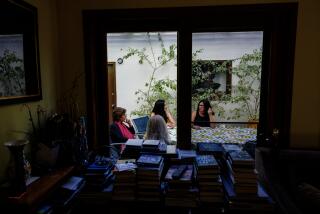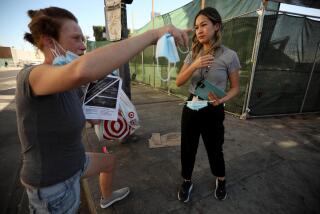CRENSHAW : They Treat the Body and Lift the Spirits
- Share via
When Ada Sellers went to her doctor in September for a pregnancy test, she figured that the most shocking news she could get was that she was expecting a child, at the age of 46.
She was wrong.
Sellers’ doctor sat her down and broke the news that not only was she pregnant, she was HIV-positive. Sellers said that because she was in a longtime, monogamous relationship, she was at a loss to explain how she contracted the virus, and she said her doctors have yet to determine the source. But after the initial disbelief came something worse: fear.
“I cried and walked the floor a long time that night,” recalled Sellers, a mother of five. “I couldn’t sleep. I didn’t know who to talk to. I didn’t know what to do.”
Sellers finally picked up the phone and called an HIV hot line, and through it discovered the T.H.E. Clinic for Women, a community-based facility at 3860 W. Martin Luther King Jr. Blvd. that specializes in treating women with AIDS and HIV infections. Today, Sellers says she is feeling much more hopeful, thanks to the clinic’s support.
“They are there for you in so many ways,” she said. “I can call whenever I have a problem. They take care of all my medical needs. If it wasn’t for them, I don’t know where I’d be.”
The T.H.E. Clinic--the acronym stands for To Help Everyone--has been hailed as a pioneer in health care tailored for women. Since opening in 1974, it has offered comprehensive medical and psychological services for minority and low-income women, and today offers the largest program for HIV and AIDS-infected women in the county, said director Sylvia Drew Ivie.
Serving women is not the only reason the clinic is special. Similar medical facilities may offer services in Spanish, but T.H.E. Clinic has 62 physicians and other staffers who speak 10 languages, including Spanish, Japanese, Thai, Tongan and Vietnamese. It serves nearly 20,000 patients annually, including 115 currently in the HIV program.
“Women, particularly women of color, need different kinds of intervention than men,” said Ivie, a former civil rights lawyer who has headed the clinic for five years. “Also, information needs to be discussed with a Japanese woman very differently than it’s discussed with an African American or Latino. We operate from that standpoint.”
The clinic offers a wide array of services that have increased in scope as health problems have grown more complex. It not only provides gynecological and general primary health care, but prenatal care, pediatric services, psychosocial counseling, parenting classes and a teen health program that added a peer counseling component in November. The clinic is adding separate facilities, including a lounge and counseling rooms, for teen-agers. “We’re treating teens like a community with another language,” said Ivie, who employs 18 students from local high schools as part-time workers. “We train them to give each other information, to cut through problems like peer pressure and self-esteem. An adult telling them, ‘This is birth control’ is much less effective than one of their peers saying, ‘Can you deal with this?’ ”
For all of its innovations and the rave reviews it regularly gets from the health care community and elected officials, Ivie says she wonders where her clinic, which is 80% government-funded, will fit in with the plans for national health care reform.
Though T.H.E. charges fees based on each patient’s ability to pay, half of its patients are on Medi-Cal, and many more are immigrants who don’t have insurance. “The need for our services will exist, but I don’t know if we will be cost-efficient enough,” Ivie said. “It’s a little worrisome.”
For HIV patient Beverly Mosley, 46, no price can be put on the support the clinic gives her, particularly during personally trying times. “They make you feel like you’re family,” she said. “At other places, you’re a dollar. Here, I do volunteer work when I’m not a patient. That’s how much I owe them.”
More to Read
Sign up for Essential California
The most important California stories and recommendations in your inbox every morning.
You may occasionally receive promotional content from the Los Angeles Times.












